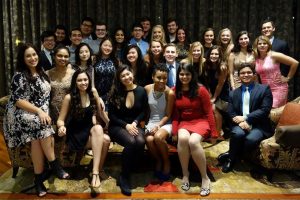
On May 24, 76 ChemBE seniors were among the 1,500 students graduating from Johns Hopkins University and taking the first steps in their next journeys. During their time in the department, they made discoveries in classrooms and laboratories, weathered Transport Phenomena and Separations classes, met peers who will become lifelong colleagues and friends, and selected pathways toward future destinations.
For some, those routes include graduate school. Institutions of choice include Johns Hopkins, Stanford, MIT, and Princeton, among others. Other graduates plan to enter the workforce and have accepted positions at companies including Deloitte, Pfizer, and WR Grace.
Though Commencement marks a divergence in their pursuits, members of the ChemBE Class of 2017 agree that their years together were a time of academic challenge and breakthrough leavened with an abundant camaraderie they expect to persist into their next adventures. “What I’ll remember most is definitely the people I met,” says Christina Sierra.
Sierra, a first-generation college student and the daughter of immigrants, plans to attend medical school in two years. But first, she lined up a job at Leidos Biomedical Research, Inc. during a networking event sponsored by the ChemBE chapter of the American Institute of Chemical Engineers (AIChE). The department’s approach to teaching—presenting students with challenges and allowing them independence while solving them—prepared her well for both roles, she says.
“We were never explicitly taught what to do, but at the same time, we always had the fundamentals to do it. And we were able to figure it out,” she says.
For Brian Ryu, that independence began during his sophomore year, when he started his own research project: exploring how patterned microstructures on a surface affect interactions between surfaces. The experience confirmed that he wants an academic career so he can pursue both research and teaching, and he will enter a PhD program in chemical engineering at Stanford this fall.
It also gave him practice with the mentality of perseverance he says research requires. With a higher degree of autonomy than most undergrads experience in the lab, Ryu was responsible for his project from beginning to end, including its initial design, the experiments themselves, data analysis, writing up the results for publication, and the editing process. His paper was published in Langmuir in December.
“I learned that research is very hard; there are so many experiments that fail before you get that one successful outcome,” says Ryu, who received a 2017 graduate research fellowship from the National Science Foundation. “Failed experiments are a learning process. Understanding why things fail, and shifting your design and protocols to address those failures, are a step that scientists and engineers need to learn when designing experiments.”
It was practice with designing experiments that taught Fatima Umanzor the most valuable lesson she will take from her time at ChemBE: the knowledge that being a good engineer is less about excelling in class and more about “learning how to learn.” During an internship at a biotech company the summer before her senior year, she used those skills to troubleshoot a manufacturing issue. “It was pretty cool to be able to go to them at the end and say, ‘I fixed it,’” she says.
Umanzor, who is poised to start a job in software at Capital One, says members of the class balanced one another’s strengths and weaknesses as they helped each other learn the material, an approach she plans to continue wherever she goes.
“ChemBE is very good about collaboration and working in teams and learning how to ask for help, and that will stay with me no matter what I do,” she says.
Like Ryu, Kevin Trigani, who will enter the University of Pennsylvania’s PhD program in chemical and biomolecular engineering this fall, also confirmed his interest in research through his lab experience. “I learned research is trial and error, and you make a lot of mistakes and correct for that; you hit roadblocks and keep going,” says Trigani, who plans a career in the pharmaceutical or biotech industry focused on drug delivery or gene therapy.
Tight friendships, both inside and outside the classroom, distinguished the class, Trigani says. “ChemBE is a fairly big major, but you get to know everyone and it feels not that big at all,” he says.